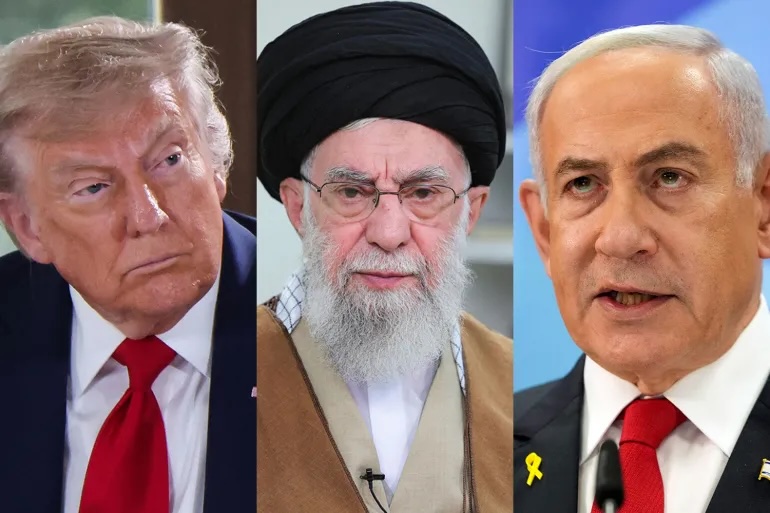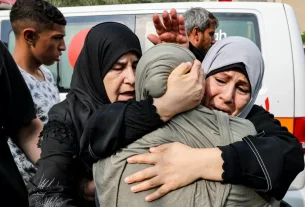U.S.-Israeli attacks on Iran: Rethinking Nigeria’s foreign policy
US, Iran, Israeli leaders
By‘Femi D. Ojumu
Force projection, unipolarity on the specific issue of strategic and operational military pre-eminence to advance geopolitical and national interests, infractions of the fundamentals of international law pursuant to breaches of United Nations 1945 Charter, and the usurpation of sovereign autonomy were fully evident in the calibrated attacks on Iran’s nuclear facilities by the Israel (effective June 13, 2025) and its United States ally (effective June 22, 2025).
Iran retaliated, firing ballistic missiles into Israel, whilst the allies of the former, Yemeni Houthi rebels, have targeted missiles at Israeli in part, in solidarity with innocent Palestinians caught up in the war between Israel and Hamas which began on October 7, 2023.
Pursuant to U.S. attacks on Iranian nuclear facilities on June 22, 2025, Iran on June 23, 2025, responded by attacking Al Udeid Air Base in Qatar, the largest U.S. military base in the Middle East, where the U.S. situates approximately 40,000 troops,with potentially grave consequences for regional stability and international security.
Whilst no American casualties were recorded, the strategic significance of the Iranian strike at the beating heart of U.S. military operations in the Persian Gulf is inescapable on three counts.
First, it highlights Iranian force projection capabilities across the region. Second, in military terms at least, Iran is not a pushover. Third, it raises the important issue of the potential of World War III if Iranian allies, Russia and China, join the conflict, as the United States has done to defend Israel.
These harsh realities of the direct war between Iran versus Israel/U.S., therefore expose not just a failure of diplomacy, but two competing schools of thought and critical posers regarding the practical limitations of sovereign autonomy, exceptionalism and military pre-eminence; pre-emption, the rule of law; the impartiality or bias of the International Atomic Energy Agency (IAEA) regarding the timing of its pivotal report on June 12, 2025 on the eve of the first wave of attacks on Iranian nuclear facilities, and how these pertinent dynamics impact Nigeria’s foreign policy aspirations.
The first school of thought (the “hawks”) espouses the philosophy that Iran represents a lingering existential threat to U.S, Israeli, and Western national and geopolitical interests. Essentially, because, of the West’s contention that Iran is committed to the destruction of Israel, supports Hamas fighters in Gaza, Hezbollah fighters in Lebanon, Syria, Houthi rebels in Yemen; and that Iran is a repressive state, that undermines peace and stability in the pro-Western Middle-Eastern states like Saudi Arabia, UAE, Bahrain and beyond.
In Wars of Ambition: The United States, Iran, and the Struggle for the Middle East (2024), Ostovar Afshon contended that “the simmering conflict between Iran and Israel, which is driven by the Islamic Republic’s aim of destroying Israel as a Jewish entity, fuels the Palestinian crisis, and reverberates across the region and beyond…Those had been Iran’s goals since the 1979 revolution…”
The policy rationale of the hawks is that Iran cannot, and will not be allowed to possess nuclear capabilities whether for peaceful or non-peaceful purposes. And these strategic policy objectives will be, and are being, enforced not only by deterrence, but rather by strategic ambivalence, pre-emption, and destruction of Iran’s nuclear capabilities through U.S./Israeli force projection and tacit support from NATO and Western allies.
U.S. President, Donald Trump, and Israeli leader, Benjamin Bibi Netanyahu lead the hawks’ vanguard. Authority for this proposition is further evidenced in Conflict: The Evolution of Warfare From 1945 To Ukraine (2023), where the authors, retired U.S. Army General David Petraeus and Andrew Roberts, asserted that: “The United States needs to stay at the forefront of efforts to prevent Iran acquiring a nuclear bomb, which would pose a threat to itself and serve as an incentive for several of its enemies in the region to acquire one too.”
The counterpoint to this hawkish force projection logic, is that it cripples the relative certainty of a rules based international orthodoxy anchored upon the rule of law, diplomacy, negotiation, accountability, and justice. It exposes fundamental questions too. If the U.S. and Israel can unilaterally, and or in concert with allies, invade Iran, an independent country, what then is the point of the United Nations? Of what effect is international law if it is whimsically and selectively applied by powerful countries?
What, if any, intelligent policy lessons have been garnered from challenging U.S. military campaigns in Iraq (2003 to 2011), Afghanistan (2001 to 2021), and Libya (March 2011 to October 2011), over the last three decades? If ruthless military power is the basis for enforcing foreign policy goals in Iran, upon what compelling intellectual and policy foundations do hawks challenge Russia’s invasion of Ukraine in 2022 say?
Is the International Atomic Energy Agency (IAEA), a biased, and therefore malevolent lackey of Western interests, given these material factors: That the timing of its report published on June 12, 2025, where its Board of Governors voted 19 in favour and three against, to find Iran in non-compliance with its obligations under the Nuclear Non-Proliferation Treaty (NPT), with 11 countries abstaining and two not voting at all, played a pivotal role in heightening tensions between Iran, the United States and Israel?
That barely 24 hours after the publication of the IAEA report, Israel, on June 13, 2025, launched a series of attacks against Iranian nuclear facilities, killing the latter’s nuclear scientists and top military commanders on the grounds on pre-emption and that Iran was “closer than ever to obtaining a nuclear weapon” (a claim vehemently denied by Iran!)?
That nine days later on June 22, 2025, the United States Air Force and Navy, in support of Israel, attacked Iran’s nuclear facilities at the Fordow Uranium Enrichment Plant, the Natanz Nuclear Facility, and the Isfahan Nuclear Technology Centre?
That the IAEA under its Director, Rafael Mariano Grossi has, according to The Left Chapter, “not only continued its subservience to the U.S. and Western interests, but also its practice of turning a blind eye to Israel’s nuclear weapons”?
The second school of thought (the “constitutionalists”or “globalists”) adopt the philosophical position of diplomacy, the consistent application of the rule of law, due process, neutrality, a rules-based approach to resolving complex international and domestic problems, global cooperation, the projection of military force as the last, not the first, option for dispute resolution and the de-escalation of serious conflict.
The inference therefore is that pre-emption as strategic foreign policy tool is de-emphasised. The United Nations, led by its Secretary-General, Antonio Guterres, symbolises this globalists’ school, because its raison d’être is the promotion of global peace, security and cooperation amongst member states as well as providing a platform for dispute resolution through international law.
This thesis is bolstered by the seminal provisions of article 1 of the UN Charter 1945. It seeks to achieve international peace and security, by taking effective collective measures for the prevention and removal of threats to the peace, and for the suppression of acts of aggression or other breaches of the peace, and to bring about by peaceful means, and in conformity with the principles of justice and international law, adjustment or settlement of international disputes or situations which might lead to a breach of the peace.
Of course, that provision does not negate the right to self-defence and the necessary realpolitik of the latter is established via the agency of article 51. It provides that nothing in the present Charter shall impair the inherent right of individual or collective self-defence if an armed attack occurs against a Member of the United Nations, until the Security Council has taken measures necessary to maintain international peace and security.
Measures taken by Members in the exercise of this right of self-defence shall be immediately reported to the Security Council and shall not in any way affect the authority and responsibility of the Security Council under the present Charter to take at any time such action as it deems necessary in order to maintain or restore international peace and security.
Equally, the globalists’ perspective is reinforced by the provisions of Chapter VII article 39 of the Charter, which empowers the UN Security Council to determine the existence of any threat to the peace, breach of the peace, or act of aggression and shall make recommendations, or decide what measures shall be taken in accordance with Articles 41 and 42, to maintain or restore international peace and security.
Whereas article 41 affords the Security Council the discretion to establish what measures negating the use of armed force are to be employed to give effect to its decisions, and it may call upon the Members of the United Nations to apply such measures via the complete or partial interruption of economic relations and of rail, sea, air, postal, telegraphic, radio, and other means of communication, and the severance of diplomatic relations.
Article 42, establishes that should the Security Council consider that measures provided for in Article 41 would be inadequate or have proved to be inadequate, it may take such action by air, sea, or land forces as may be necessary to maintain or restore international peace and security.
Such action may include demonstrations, blockade, and other operations by air, sea, or land forces of Members of the United Nations.
To be continued next week.
Ojumu is the Principal Partner at Balliol Myers LP, a firm of legal practitioners and strategy consultants in Lagos, Nigeria, author of The Dynamic Intersections of Economics, Foreign Relations, Jurisprudence and National Development (2023).





